Biochar is Black Gold for the Soil | What Is It & Why It's Important
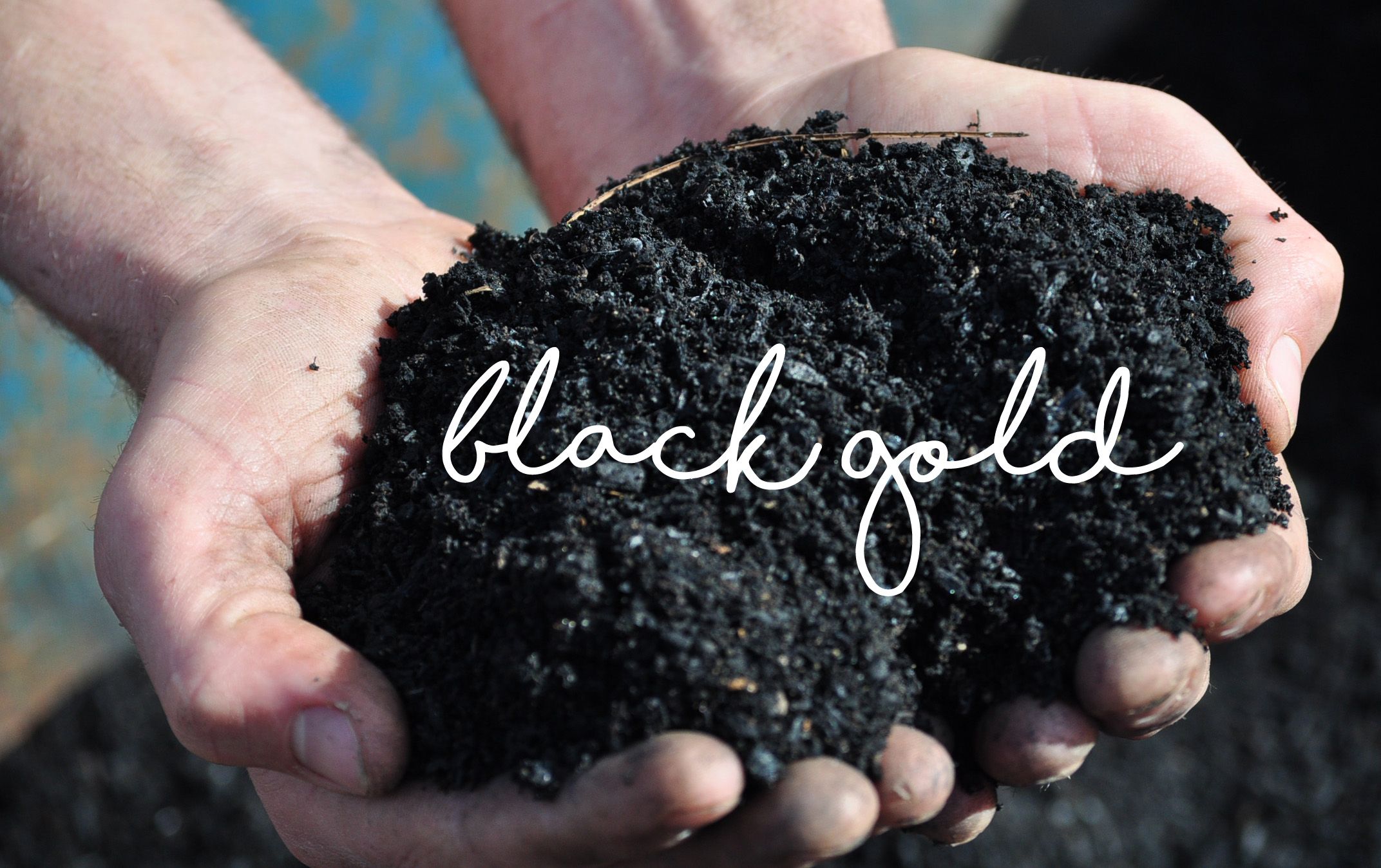
Soils are the most important and yet least appreciated structural element of our Earth (not that we're treating air or water any better).
We even go as far as to call it dirt, alluding to it being impure or unclean.
It Matters, literally
Soil is what sustains terrestrial life, and as a species we are treating it as if it didn't matter. In truth, it is the matter we are made of! This article will highlight how in small ways on our homestead we are dreaming in & stewarding a better world and creating better soil.
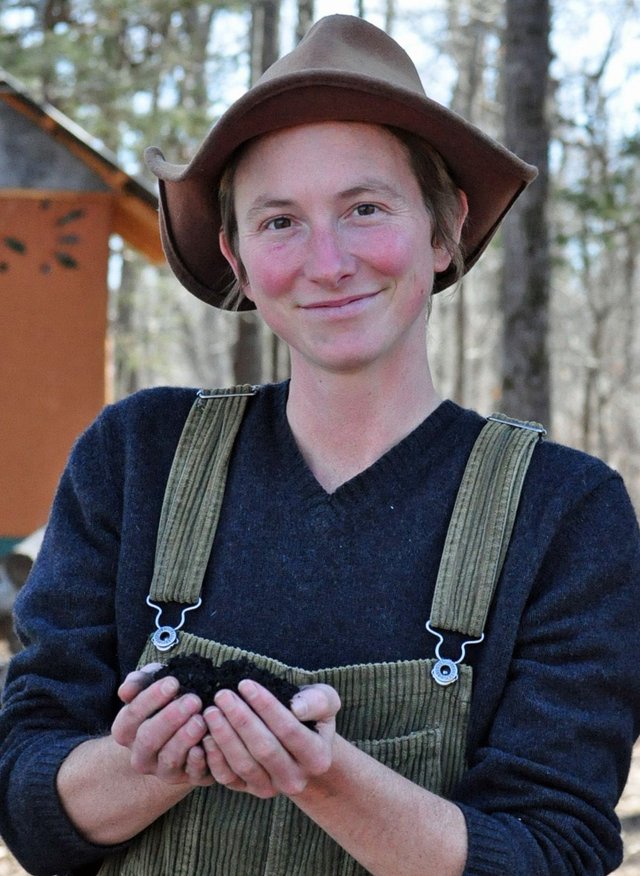
Fostering good soil health may be one of the biggest steps to ensure the continuation of our species!
That's a BIG statement, and is a response to BIG Agriculture's track record of soil degradation and pollution. While other species are dramatically affected by our actions, they're not the ones cultivating crops. Biochar offers solutions to many of today's climate issues such as depleted soils, excessive carbon in the atmosphere, agricultural runoff and increasing drought. It can be produced and applied in technically advanced or grass roots situations, transforming current agricultural "waste" into a variety of useful materials.
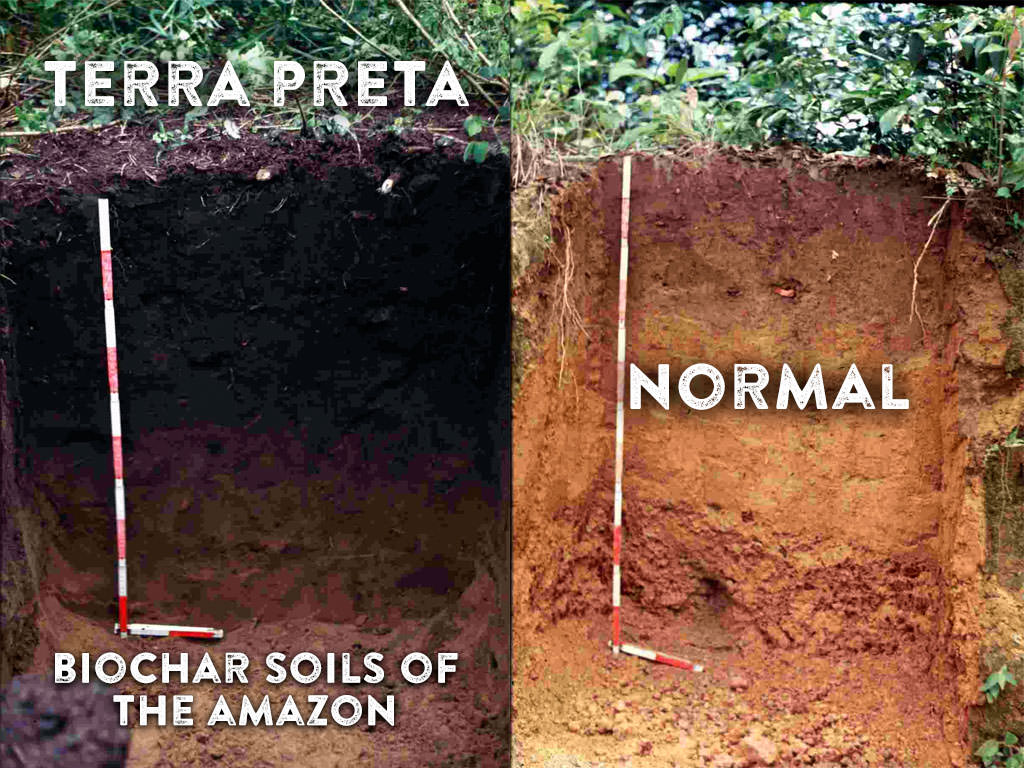
(source)
Biochar in the Amazon
Using Biochar is not a new technique, it has been used for over 2000 years in the Amazonian basin to increase the capacity for soils to yield food year and year. There it is called Terra Preta. Some archaeological sites have found charred remains 5' under the earth's surface, meaning that the practice of amending soil with biochar is certainly not new. Contrary to slash and burn where new plots are opened up as soils are depleted, the practice of slash and char allows for increased lifespan of a field or plot, slowing the rate of deforestation.
What is biochar?
Biochar is the carbon skeleton left behind after organic matter is exposed to heat while deprived of oxygen. Think fire with little or no oxygen. This process (called pyrolysis) creates a unique substance with oodles of surface area and voracious appetite for water. This skeleton is then inoculated with microbes and applied to soils. This has many advantages in the soil because it
- Attacts and holds water
- Provides many homes for microbes
- Improves Cation exchange capacity (CEC), allowing for better nutrient exchange
- Improves soil texture or tilth.
Biochar gives soils a boost that allows for higher fertility, a more balanced and active microbial community and better resiliency to a changing climate

Microscopic look of biochar, look at all that room! Source
Biochar has the potential to sequester tons of carbon from the atmosphere, helping to mitigate climate change
We've all heard the alarming facts about how much carbon human industry exudes and is spewing into the atmosphere, and the numerous negative effect it causes. Biochar offer a chance to capture some of it. Because the organic carbon is returned to the soil and not released into the atmosphere, there exists the opportunity to lock up carbon molecules in the soil food web, leading to a healthier planet. The impacts could be massive if done on a large enough scale; we could actually lower atmospheric carbon counts and help bring Gaia into better balance.

Microbial life is essential to all life, and water is needed for microbes. Biochar for the win!
Biochar is often produced from waste wood, straw or other "valueless" biomass. Of course this biomass is valuable, but it may not have a direct market value in the capitalistic system. If you were to burn biomass completely you'd get ash, aka potash, and that can also be a valuable soil amendment for boosting potassium and increasing pH (making soil more alkaline). Although applying ash to soil has advantages, creating biochar has more dramatic and long lasting effects. By providing habit and retaining moisture, biochar helps to create ideal conditions for microbes. On our homestead we make and add both to our soils. In our upcoming articles, we'll write more about this.
At base, biochar is a life supporter. Carbon is the most abundant substance of the planet, so using it efficiently makes a lot of sense. By supporting the microbes that make up the core of soil life, we are building a healthy foundation to work from. The microbes are what keep life going and the time is NOW to wake up to the unseen beings that keep the world Alive!
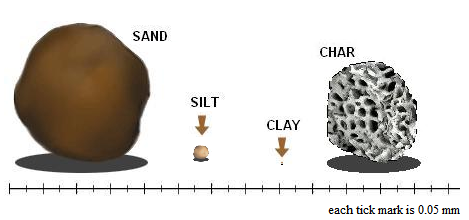
(source)
Minerals, microbes and moisture
For full potency Biochar requires the 3 Ms to be an effective soil amendment. Charred biomass alone would have benefits, but by inoculating the char, we are propelling and optimizing the resource. Trace minerals are commonly lacking in most soils oftentimes due to years of malpractice and neglect. Mixing in mineral amendments with biochar can offer a long term strategy for soil fertility management. Trace minerals such as those found in greensand (ancient sea bed), kelp, glacial rock dust can be mixed with biochar to further boost the benefits of adding biochar.
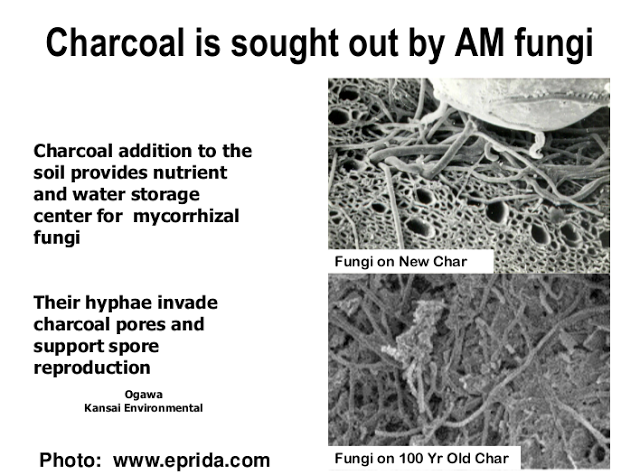
(Slide from an excellent presentation on Biochar-- click to learn more
Perhaps the most crucial element of biochar is the microbial communities present. There are several ways to achieve a diverse microbial community. In healthy soils one could simply add biochar without inoculating, hoping resident microbes would take up residency. A more thorough approach may include mixing it with compost, healthy soil or commercial microbial mixes before applying to soil. My favorite option is to brew a compost or vermicompost tea to boost microbial populations before soaking the char in the microbe rich environment. This is achieved by aerating a quantity of water that has a small amount of compost or worm castings suspended in it and adding food such as molasses for microbes to eat. This is an effective way to dramatically multiply the microbes that are so crucial for a healthy soil food web.
Of course moisture is needed for the biochar to act as an effective ammendment. This can be achieved by presoaking, peeing on or thoroughly watering the biochar when it is applied.
This all sounds so awesome, but where do I get the stuff?
Many companies are now distributing biochar produced in centralized kilns, but I prefer making my own. I will be documenting how we are practicing slash and char agricultural and how you too can transform brush and other "waste" biomass sources into useful biochar. @mountainjewel, our homestead, we are establishing a diverse planting of edible and medical trees and shrubs on our 18 acre homestead and are using biochar to amend and improve soil quality and plant health.
Stay turned for the next installment where I will document the simple method of production we use and how to get the most out of your soil by taking care of it well.
Learn how to make you own black gold...
This post was written by a passenger on the #ecotrain. Check the tag for more enlightening and ecologically and socially conscious writings!

BIOCHAR ROCKS!
I always add biochar into my compost!
Makes it easy to ammend beds!
So true, and the microbes in compost may add diversity to the biochar.
BINGO!
My masters thesis was about another use of biochar, ha! Apparently biochar can be quite good adsorbent of organic contaminants (cheaper alternative of activated carbon) and can be used in water treatment too!
Fascinating! I love the multiple uses, thanks for sharing the info. I wonder if adding mycelium to biochar would boost cleanup potential?
Sounds a lot like how they make Activated Charcoal from Coconut Hulls. Burn them and then remove the oxygen. It creates huge amounts of surface space which wants to clings to bad stuff in your gut. Comes in handy if you've eaten something that's making you sick.
I can't wait to see the process of making the biochar!
That's neat. High surface area to the rescue! Love to hear all the uses for charred biomass. Next post in progress...
Awesome! I know my husband has spoken of this Biochar. Eagerly awaiting your next post so I can surprise him with some how-to knowledge! 😁
Nice, get that know-how! Will post ASAP, sitting in front of a burn as I write.
@dynamicgreentk look 👍
NICE INFO!
Soil is so important. I am lucky to have chickens and quail and they make the best soil amendment for my veg. I even use my coffee grounds round them in the summer.
Good call on using bird manures, its good stuff for sure.
Good post, I am a photographer, it passes for my blog and sees my content, I hope that it should be of your taste :D greetings
Yay! Biochar is such a useful product, remember making it by the barrel at the ol' community garden! Getting all that extra CEC will make sure the plants are well looked after in terms of nutrients!
Happy to hear you have experienced the benefits. I feel like as a society, there's so much we have to explored in this vein. But as always, real changes starts on the ground, like in a community garden ;)
Absolutely, resteemed!
This was excellent.I have a good friend who built a huge brick biochar oven and sells under the name Bluegrass Biochar. It's tough to get clients though because biochar is such a foreign idea to so many people.
I wish your friend all the best. It is tough to operate it as a business as biochar may be a foreign idea but one that I feel will catch on like wild fire (pardon the pun). It's still a fringe and cutting edge idea, but soon enough proven results will make it mainstream. I'll check his company out.